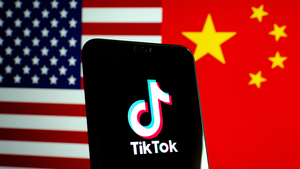Pressure is mounting on TikTok in US political circles once again over concerns that the Chinese government has control over its owner, China-based Bytedance. A group of Congress members have proposed a new bill that orders Bytedance to sell TikTok, otherwise the social media app will be banned within the US.
“This is my message to TikTok: break up with the Chinese Communist Party or lose access to your American users”, says Mike Gallagher, one of the politicians introducing the bill into the House Of Representatives. “America’s foremost adversary has no business controlling a dominant media platform in the United States. TikTok’s time in the United States is over unless it ends its relationship with CCP-controlled ByteDance".
TikTok CEO Shou Zi Chew was recently in Washington and repeated the company’s position that there are no data security issues on TikTok resulting from its China-based owner. He told Congress members that US user data is stored by its US partner Oracle on US servers and can only be accessed by “vetted personnel”.
There have been various attempts to ban the use of TikTok in the US over concerns about its China connections. When he was US President, Donald Trump issued an executive order banning American citizens and businesses from transacting with the TikTok owner, and another ordering ByteDance to sell the app.
Lawmakers in the US state of Montana also passed a law outright banning distribution of the app within that state. And members of the US Senate previously proposed anti-TikTok legislation.
All of those efforts have run into free speech issues and the argument that banning use of TikTok breaches the First Amendment of the US Constitution. As a result, US courts paused both of Trump's executive orders - which Joe Biden later cancelled - and the ban in Montana.
TikTok pulled out the First Amendment once again in response to the new bill in the House yesterday. "This bill is an outright ban of TikTok, no matter how much the authors try to disguise it", a spokesperson told reporters. "This legislation will trample the First Amendment rights of 170 million Americans and deprive five million small businesses of a platform they rely on to grow and create jobs".
Beyond the First Amendment arguments, TikTok also denies that there are data security issues on its platform related to its ownership by China-based Bytedance. In a recent Congressional session, CEO Chew - after going to great lengths to clarify that he is Singaporean and has no connections to the Chinese government - re-stated that position.
"The bottom line is this, American data is stored on American soil by an American company overseen by American personnel", he said, referencing TikTok's alliance with Oracle that began when the Trump ban was pending. "Today, US TikTok data is stored by default in Oracle servers. Only vetted personnel operating in a new company, called TikTok US Data Security, can control access to this data".
Back to the bill in the House, and a press release provides a little more information about what it would do, if passed. "It prevents app store availability or web hosting services in the US for ByteDance-controlled applications, including TikTok, unless the application severs ties to entities like ByteDance that are subject to the control of a foreign adversary", it explains. "The bill provides ByteDance with a window of time to divest, and the bill’s prohibitions do not apply if it completes a qualified divestment".
The legislation would also provide a framework for dealing with other apps that raise national security concerns. "It also creates a process for the President to designate certain, specifically defined social media applications that are subject to the control of a foreign adversary and pose a national security risk", the explainer continues. "Designated applications will face a prohibition on app store availability and web hosting services in the US unless they sever ties to entities subject to the control of a foreign adversary through divestment".

